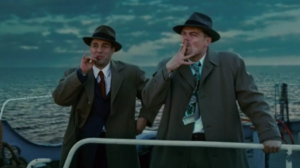“Shutter Island,” directed by Martin Scorsese and based on Dennis Lehane’s novel, is renowned for its intricate narrative and unexpected twist ending. The film follows U.S. Marshal Teddy Daniels (Leonardo DiCaprio) as he investigates the disappearance of a patient from a psychiatric facility on a remote island. As the story unfolds, subtle clues hint at the film’s true nature, which is revealed in the conclusion.
Key Clues Leading to the Twist
- Teddy’s Aversion to Water: Throughout the film, Teddy exhibits a strong aversion to water, which is later explained as a subconscious reminder of his wife, Dolores Chanal, who drowned their children. This aversion serves as a psychological barrier, preventing him from confronting his past.

- The Anagram of ‘Edward Daniels’: Teddy Daniels’ full name is an anagram of ‘Andrew Laeddis,’ his true identity. This subtle detail is a key narrative device, reflecting the film’s themes of identity and self-deception.
- The ‘Law of Four’ and ‘Patient 67’: Teddy discovers a note containing the ‘Law of Four’ and a reference to ‘Patient 67.’ The ‘Law of Four’ refers to the four anagrams in the film: Edward Daniels, Rachel Solando, Andrew Laeddis, and Dolores Chanal. ‘Patient 67’ refers to Teddy himself, who is the 67th patient in Ward C.
- The Lighthouse as a Metaphor: The lighthouse, a central location in the film, symbolizes the truth that Teddy is reluctant to face. His journey to the lighthouse represents his confrontation with reality and the unveiling of his true identity.
- Chuck Aule’s True Identity: Teddy’s partner, Chuck Aule, is revealed to be Dr. Lester Sheehan, Teddy’s primary psychiatrist. This revelation underscores the film’s exploration of perception and reality, as Teddy’s delusions have constructed an alternate persona for his psychiatrist.
- The ‘Real’ Rachel Solando: Teddy encounters a woman claiming to be the real Rachel Solando, who warns him about the hospital’s experiments. This encounter is a hallucination, reflecting Teddy’s mind’s attempt to create a narrative that aligns with his delusions.
- The Final Line: In the film’s conclusion, Teddy, now acknowledging his true identity as Andrew Laeddis, asks Dr. Sheehan, “Which would be worse: to live as a monster, or to die as a good man?” This line encapsulates the film’s central theme of guilt and redemption, highlighting Andrew’s internal struggle.
These elements, woven throughout the narrative, guide the audience toward the film’s central revelation. Upon a second viewing, the subtlety of these clues becomes more apparent, enhancing the depth and complexity of “Shutter Island.”
